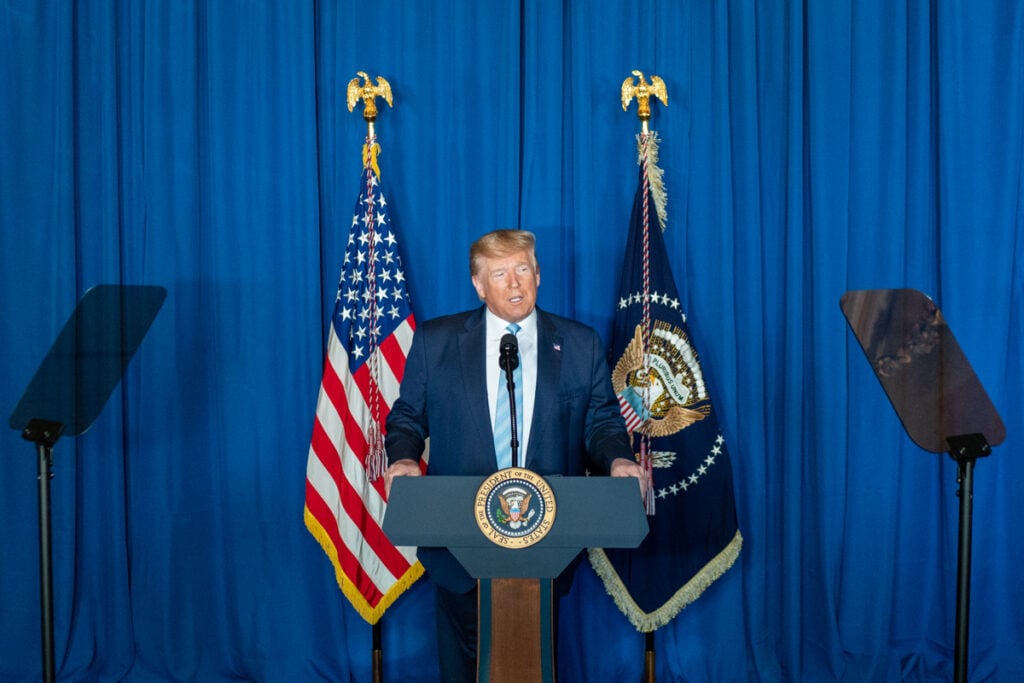FBI Office in Miami Launches Urgent Manhunt for Iranian Intel Officer, Accused of Plotting Assassinations of Several Trump-era Officials

On Tuesday, news reports began to circulate, announcing the hunt for an Iranian named Majid Dastjani Farahani. According to the FBI, “[he] is wanted for questioning in connection with the recruitment of individuals for various operations in the United States, to include lethal targeting of current and former United States Government officials as revenge for the killing of IRGC-QF Commander Qasem Soleimani.”
Ordered by former president Donald Trump, Soleimani was killed by a U.S. drone strike in January 2020 near a Baghdad airport. Officials on Iran’s retaliatory kill list include former Secretary of State Mike Pompeo, former national security adviser John Bolton, former U.S. special representative for Iran Brian Hook, as well as other current and former officials of the U.S. government.

The FBI said Farahani is suspected of “[recruiting] individuals for surveillance activities focused on religious sites, businesses, and other facilities in the United States, [and he may acting or is] purported to act for or on behalf of, directly or indirectly, Iran’s Ministry of Intelligence and Security (MOIS).”
The Gateway Pundit spoke to Adrian Calamel, a scholar of the Middle East and terrorism. “When a MOIS agent shows up on your shores,” he said, “everything should be blinking red, and you have to get nervous.”
There are any number of tasks the Iranian secret agent could have been assigned to do. “But the reason the FBI is looking for Farahani, if he is indeed a MOIS agent, is because they are the individuals who have traditionally carried out assassinations abroad,” Calamel explained.
Calamel offered several questions that must be answered: “Does the FBI have a solid lead on Farahani or his alleged plot? How did he get into the country and how long has he been here? Is he even still in the country?” Apart from those questions, he wonders if the FBI even knows his true identity. According to him, all MOIS agents use pseudonyms.
“Generally,” he said, “Iran’s assassination operations would be set up by a MOIS agent, coordinating everything that would need to take place, but in many cases, the agent would be out of the country when another team comes in and takes over to carry out the operation.”
According to Calamel’s sources inside the Islamic Republic of Iran, “[the Middle Eastern country’s] stated goal is to drop an American official on U.S. soil for the Soleimani strike, which also killed Iraqi PMU commander Abu Mahdi al-Muhandis.”
“Even with all the unrest in the Middle East and relatively frequent attacks against our military and our foreign interests,” Calamel warned, “we still have not seen Iran’s response to the death of Soleimani.” According to him, “What they want to show more than anything is that they can come out and touch us on our soil just like we did there—and that should have all U.S. national security agencies on alert.”
The FBI has asked anyone with information about the plot to contact their local FBI office or the nearest American embassy or consulate.
Knocking at the Door
Farahani, who also speaks Spanish, is known to move frequently between Iran and Venezuela. Calamel said, “Iran has definitely planted themselves on our southern doorstep, propping up the [Nicolas] Maduro regime in the failed state [of Venezuela].” In his opinion, “Iran saw the vacuum and they filled it.”
“Sitting at our backdoor,” Calamel said, “Iran is using Venezuela as a narco-state.” But he pointed out, the northern coast of South America isn’t the only region that helps facilitate their criminal and terrorist interests. “Outside of the government in Argentina,” he said, “everybody is aligned with the Islamic Republic.”
Calamel also said that Iran’s presence further north is “concerning,” referring to the Panamanian province of Los Santos. He pointed out that Iran’s terror proxy Hezbollah and the province are “working hand in glove with one another.” To that end, he said, “there’s full cooperation between them culturally, politically, and militarily.”
And when he considered a clear path between Colombia and Panama, through the Darien Gap, he said, “who knows what Iran and their proxies could move along there if provided an open highway.”
“The potential for something to happen for worse than 9/11 or an assassination plot is there,” Calamel said, warning that “a disaster on our soil might be unavoidable.”
